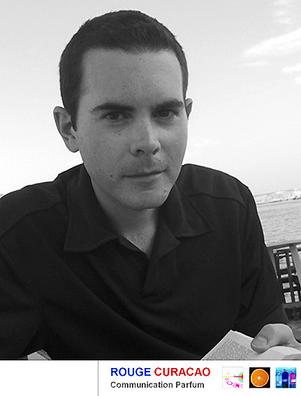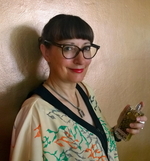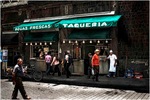Interview With Nicolas Olczyk, Fragrance Consultant - ROUGE CURACAO {Passion for Perfume - Portrait}

Nicolas Olczyk, thank you for accepting to answer our questions. You are an independent fragrance consultant based in Paris, France, the founder and owner of ROUGE CURACAO, as well as a journalist working for osMoz, an educational and informational website owned by fragrance development company Firmenich.
TSS : How did you become interested in perfumes and when did you know it was going to become your profession? Was there an epiphany, an aha moment or was it more progressive?
Nicolas Olczyk:
I guess I fell in love with scents when I was a child. I travelled a lot and particularly to the French West Indies where I got attached to the culture. There, scents are everywhere! Moreover, my uncle had an aromatic company where I was able to improve my olfactory training. I did a master’s degree in chemistry that I completed with a work placement in Grasse. Between 1999 and 2002, I continued to train ‘on the other side of the mirror’ in the sales force for Sephora and then for Estée Lauder Companies. This enriching experience allowed me to understand better customers’ perceptions, but also to have a sharp vision of the whole perfume development process, from the labs to the final client.....
TSS : When did you establish your business ROUGE CURACAO and why this name in particular?
Nicolas Olczyk:
I’d been working in the cosmetic industry for 8 years. I decided to work as an independent consultant in 2002. Then I chose this name. It conveys a rich sensory image: curacao is an orange liqueur, a color and an island of the Caribbean. The contrast with rouge (red) creates a certain oddness that is adapted for a communication agency’s name.
TSS : Could you explain to us what you do as a fragrance consultant? On what perfumes have you worked? What were some of your best experiences?
Nicolas Olczyk:
I work in cooperation with perfume brands, perfume companies and perfume PoS on different projects : fragrance development consultancy, trend watch, communication and training tools, etc. This year, I also led different conferences for Isipca students. I love what I do because it is varied, rarely monotonous. To answer your second question, I often work ‘in the shadow’ of products. Furthermore I do not work only on the fine fragrance segment, I also help my clients to propose original notes in home fragrances, body-care and household. Regarding fine fragrance, I was in charge of communication tools for several brands, like Agent Provocateur for instance. Currently, I’m working with niche brand Etat Libre d’Orange on the development of a special new fragrance.
TSS : What do you make of the increased number of launches that now seem ready to invade the market not even on a yearly basis, but on a quarterly basis? It seems that more perfumes are "improvised" over the course of a 3-month period, perfumes that were not even announced in advance but seem to correspond to the perceived need to respond to a very competitive market. What is the shortest period of time in which you know that a marketed perfume was created?
Nicolas Olzcyk:
It becomes, indeed, more and more difficult to smell everything ! There are many launches, because brands operate on almost all segments today: prestige, niche, travel retail, limited editions, masstige, mail order... With for many of them, new products in several of these different categories. To answer your second question, there are brands, and not only niche brands, that keep the same shapes of bottle for new fragrances: this shortens the time between the ‘perfume brief’ and the launch. Sometimes also, it suffices to re-package a limited edition, a former fragrance or a travel retail fragrance that already existed and to give it another name. So yes, it can be quicker today to launch a fragrance.
TSS : Do you think that most perfumers think of their profession as an art or do they think more commonly or realistically perhaps of it as a craft with more limited goals?
Nicolas Olczyk:
Except perhaps for independent perfumers, I would say that the work of a perfumer is getting more and more technical and subjected to constraints : the growing prices of raw materials (both natural and synthetic), the legislation that becomes more and more drastic... Furthermore, many perfumers do not work on fine fragrances and have to consider matters of stability, colors, environmentalism....
TSS : Do you think that there is a crisis in perfumery today? If not, what are the optimistic signs of well-being? If yes, what do you think should be done to overcome the crisis?
Nicolas Olczyk:
These legislation problems are a real brain-teaser for brands and perfumers. Organisations like IFRA or COLIPA work hard and efficiently. But the consumer does not always have answers to his questions when he wants to buy scented products. Regarding optimistic elements, I’d say that some geographic areas, but also some kinds of scented products in Western countries are growing markets. What’s more, in Western countries, the fine fragrance market is going top-of-the-line, with new alternative brands, private collections and the arrival of new players in the prestige segment.
TSS : Do you have any favorite perfumers?
Nicolas Olczyk:
I like perfumers who create scented stories as painters imagine a canvas, with colors, light effects, personal memories... Olivia Giacobetti has this ability and liberty. Céline Ellena, Isabelle Doyen also. To cite a man, I’d say Alberto Morillas, without any hesitation.
TSS : What is your position on authorship in perfumery? Should or can perfumes be copyrighted?
Nicolas Olczyk:
There are many problems : find judiciary experts that are olfactorily skilled, determine the status of the perfumer (is he an artist, an artisan... ?). Moreover, let’s imagine 2 different fragrances but created by the same perfumer. Who should be protected, the brand or the perfumer? The rare cases when Law said ‘it is a copy’ were when the scent AND the bottle, the concept... seemed to be counterfeits.
TSS : What are the differences that you see between French and American tastes for perfumes, if any? Are these taken into account for the creations of different formulations for the "same perfumes" that will be sold in different markets?
Nicolas Olczyk:
The differences are important. For instance, when you look at the Top 10 in France, the oriental scents are predominant for women and rather strong for men. In the USA, the top 10 is principally floral for women, and men scents are quite aromatic. Notwithstanding, it seems to change a little bit with more chypre and oriental scents (both men and women) in the USA. Another difference is that the American market is more sensitive to new products, European markets are more conservative. For example, we have almost no celebrity brands in France. Except for Céline Dion and maybe Kylie Minogue that is brand new, it doesn’t work here. To address your second question, brands are always mute about what’s exactly in the formula... But you have limited editions or variations of classic scents that we can’t find here.
TSS : What interesting trends do you see emerge in perfumery today? What future developments do you predict are going to take place?
Nicolas Olczyk:
There are many trends that seem to emerge in perfumery. Among them: organic, more elitist masculine, more mature gourmand, new greens, Asian influences, salted cooking inspiration, etc. Regarding the future, last year I led a conference with perfumer Karine Chevallier. The theme was: ‘Perfume, Tomorrow : new emotions, new roles’. We imagined several scents around 3 axes: ‘Unheard-of nature & ecological values’, ‘Cosmopolitan inspirations / world perfumery’ and ‘New discoveries: spatial and geological research’.
TSS : What are the launches you are looking forward to?
Nicolas Olczyk:
Actually, I hope to be surprised. But with 700 to 800 products expected to launch, this becomes a rare feeling. In the 1980’s, with scents like Poison, the perfume launches used to be real events. Today, except for some brands, this type of launches seems to be over. As Vera Strübi -Thierry Mugler ex CEO- said, brands must bring dream daily to the consumer. I think a return to our roots is a real need.
TSS : And now for our little ritual: what are the 10 perfumes you think that people ought to experience at least once in their lifetime?
Nicolas Olczyk:
I’m sure I’m going to forget major products! But let’s say: Vétiver by Guerlain, Mitsouko, Aromatics Elixir, Déclaration, Angel, Polo, Eau de Rochas, Eternity (for women). And as for niche brands: Timbuktu by L’Artisan Parfumeur and Sequoia by Comme des Garçons.
TSS: Thank you very much Nicolas Olczyk.









